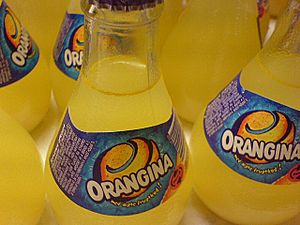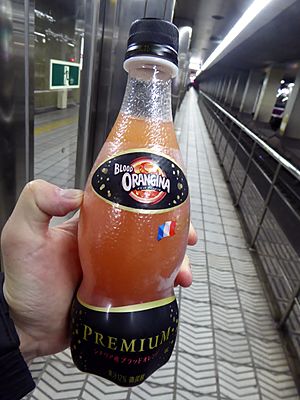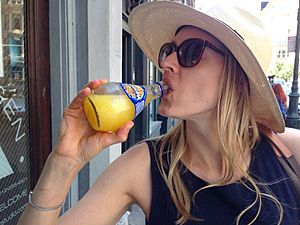Orangina facts for kids

Orangina bottles
|
|
| Manufacturer | Suntory |
|---|---|
| Introduced | 1936 |
| Colour | Orange/yellow/amber |
| Ingredients | Citrus |
Orangina is a popular fizzy drink. It's made with bubbly water and lots of citrus juices. These juices come from oranges, lemons, mandarins, and grapefruits. Orangina also has a little bit of orange pulp, which makes it special. It's sweetened with sugar or other sweeteners, and natural flavors are added too.
A Spanish pharmacist named Agustín Trigo Miralles first created this drink in the early 1930s. He called it Naranjina. In 1935, he sold his idea to Léon Beton, a French businessman. Today, Orangina is a very popular drink in many parts of the world. You can find it in Europe, Japan, North Africa, and some parts of North America.
Contents
The Story of Orangina
The story of Orangina began in 1935. Léon Beton, a French businessman, met Dr. Agustin Trigo, a Spanish pharmacist. Dr. Trigo showed off his new drink, "Naranjina," at a trade fair in Marseille, France. This drink was a mix of citrus juices, fizzy water, and sugar.
Léon Beton, who owned an orange farm, bought the recipe. The first bottle of "Orangina, soda de naranjina" was launched that same year. However, big wars like the Spanish Civil War and World War II made it hard for the brand to grow.
A New Era for Orangina
Léon Beton's son, Jean-Claude Beton, took over the company in 1947. Jean-Claude kept most of the original recipe. He worked to make Orangina popular with people in Europe and North Africa. Soon, Orangina became a common drink across French North Africa.
In 1951, Jean-Claude Beton introduced Orangina's famous 250 ml bottle. This bottle became a symbol of the brand. It looks like a round orange, and its bumpy glass texture feels like orange peel.
In 1962, the company moved its production to Marseille, France. This happened around the time Algeria became independent. In 1984, Orangina joined the Pernod Ricard group. Around this time, the classic glass bottle got a new look from designer Martin Jones.
In 2000, the Coca-Cola company tried to buy Orangina. But this sale was stopped because of rules against companies becoming too big. Instead, Cadbury Schweppes bought the Orangina brand. Cadbury Schweppes also owned other soft drink businesses from Pernod Ricard.
By 2006, Cadbury decided to focus on making chocolate. They looked for buyers for their soft drink businesses. Since Coca-Cola and PepsiCo were too big to buy it all, the soft drink company was split up.
Orangina in North America
Orangina first came to the United States in 1978. It was called Orelia then, but the original name was brought back in 1985. For a while, Orangina for North America was made in Canada. Later, production moved to Hialeah, Florida, in the United States. Mott's LLP made it under a special agreement.
After some company changes, Dr Pepper Snapple Group Inc. (now Keurig Dr Pepper) owned the brand. Eventually, Orangina production moved back to Canada.
In the United States, Orangina is often sweetened with high-fructose corn syrup. In Canada, it's sweetened with sugar and glucose-fructose. Some Orangina sweetened only with sugar is also brought into Canada from Europe.
In 2020, Suntory took over the brand in North America. They allowed Ventures Foods and Beverage to sell it. However, by 2024, Orangina became very hard to find in the United States. In Canada, Aliments Unique Inc. still sells the brand widely.
Orangina Around the World
From 2006, two investment companies, Blackstone Group and Lion Capital LLP, owned the brand outside North America. Their company was called Orangina Schweppes. In November 2009, a Japanese company called Suntory bought it.
In Great Britain, AG Barr used to make Orangina under a special agreement. AG Barr is famous for making Irn-Bru. More recently, Suntory's own company, Lucozade Ribena Suntory, started making it.
Orangina is also made in Vietnam by Fosters Vietnam. You can find it in Carrefour stores in Taiwan. Shemshad Noosh Co. makes it in Iran.
Who Owns and Sells Orangina?
| Owner | Territory | Distributor | Country |
|---|---|---|---|
| Suntory Holdings | Asia | F M Global MediChem Ltd | Palestine |
| Fosters Vietnam | Vietnam | ||
| Shemshad Noosh Co. | Iran | ||
| Suntory (Orangina Schweppes) | Japan | ||
| Lotte Chilsung | South Korea | ||
| Europe | Lucozade Ribena Suntory | United Kingdom | |
| Aproz Sources Minerales | Switzerland | ||
| Spendrups Bryggeri AB | Sweden | ||
| Kofola | Czech Republic, Slovak Republic | ||
| Orangina Suntory France | France, Luxembourg, Portugal, Spain, Poland | ||
| Lucozade Ribena Suntory Ireland | Ireland | ||
| North America | Aliments Unique Inc. | Canada | |
| Ventures Food & Beverage (discontinued) | United States |
Orangina Bottle Design
Orangina is well-known for its unique bottle design. The small 25 cl (8 oz) bottle is shaped like a pear. It has a bumpy texture that reminds you of an orange peel. Larger bottles also have this bumpy texture. However, they are shaped more like regular bottles.
Different Kinds of Orangina
New flavors of Orangina have appeared in Europe. One is Orangina Sanguine, made from blood oranges. It also has caffeine and guarana, and it tastes much more sour than regular Orangina.
Other flavors, like the "les givrés" series, are also sold in Europe. These are not often seen in North America. A sugar-free version called "Miss O" was launched in the 2010s.
In Tunisia, you can find Orangina Rouge, which is similar to the European Orangina Sanguine. There's also Orangina Light, a sugar-free option.
Orangina Advertising
The orange pulp at the bottom of the bottles used to be a problem for Orangina. But the company turned this into a good thing with its "Shake me" advertisements. These ads encouraged people to shake the bottle to mix the pulp.
In 2010, a commercial for Orangina was shown in France. It was seen as friendly towards the LGBTQ+ community. This happened a few weeks after a McDonald's ad with a gay teenager was shown on French TV.
Advertising Controversy
In 2008, a TV commercial for Orangina caused a lot of discussion in the United Kingdom. The ad showed cartoon animals in swimsuits. A children's charity called Kidscape criticized the ad. They said that Orangina is a drink popular with children and young people. They felt the advertisement was too grown-up and not suitable for its audience.
The ad was even called the "Freakiest Advert of 2007." It also ranked seventh for "Worst TV Ad of 2008." However, others pointed out that Orangina is also a popular drink for adults. They believed the ad was meant to create discussion and get free attention for the brand. Despite the criticism, the advertisement was popular online. By April 2008, it had been viewed three million times.
See also
 In Spanish: Orangina para niños
In Spanish: Orangina para niños
 | Precious Adams |
 | Lauren Anderson |
 | Janet Collins |



